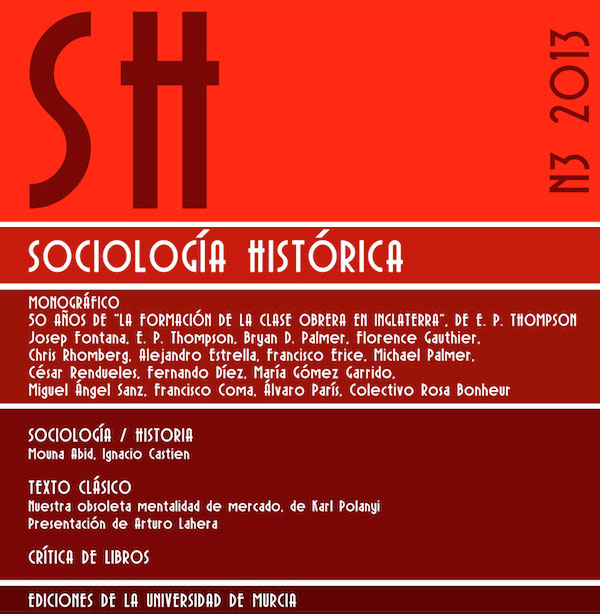The construction of 'pueblo bajo' (common people) in Madrid. Popular work, culture and politics in the crisis of the 'Ancien Régime'
Abstract
On the 50th anniversary of The Making of the English Working Class, this paper studies the history of labor and popular politics in Madrid from the perspective of Thompson’s classic. In order to pay homage to the author, we analyze the same period (1780-1833) and reproduce the thematic structure of his book. Firstly, this essay studies the impact of the French Revolution in Madrid and its role in the crisis of the Ancien Régime. Then it describes the changes on the social relations of production during the rise of capitalism, focusing on the proletarianization of artisan workforce. Finally it analyzes popular culture and politics, stressing the role of working classes in the conflicts between liberals and absolutists. Although these processes didn’t create a working class consciousness, they led to the rise and fall of another historical subject that we refer to as “pueblo bajo” (lower people).Downloads
-
Abstract475
-
PDF (Español (España))331
Las obras que se publican en esta revista están sujetas a los siguientes términos:
1. El Servicio de Publicaciones de la Universidad de Murcia (la editorial) conserva los derechos patrimoniales (copyright) de las obras publicadas, y favorece y permite la reutilización de las mismas bajo la licencia de uso indicada en el punto 2.
2. Las obras se publican en la edición electrónica de la revista bajo una licencia Creative Commons Reconocimiento-NoComercial-SinObraDerivada 4.0 España (texto legal). Se pueden copiar, usar, difundir, transmitir y exponer públicamente, siempre que: i) se cite la autoría y la fuente original de su publicación (revista, editorial y URL de la obra); ii) no se usen para fines comerciales; iii) se mencione la existencia y especificaciones de esta licencia de uso.
3. Condiciones de auto-archivo. Se permite y se anima a los autores a difundir electrónicamente las versiones pre-print (versión antes de ser evaluada) y/o post-print (versión evaluada y aceptada para su publicación) de sus obras antes de su publicación, ya que favorece su circulación y difusión más temprana y con ello un posible aumento en su citación y alcance entre la comunidad académica. Color RoMEO: verde.










